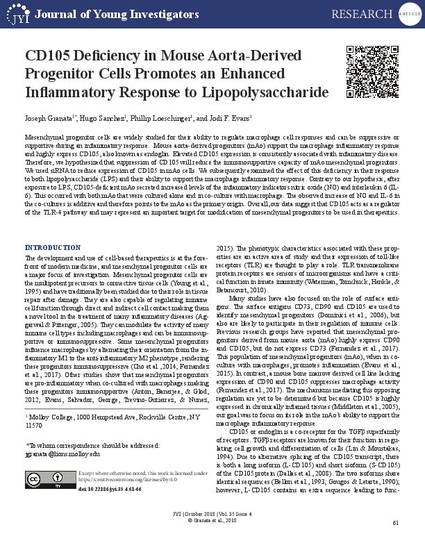
Article
CD105 Deficiency in Mouse Aorta-Derived Progenitor Cells Promotes an Enhanced Inflammatory Response to Lipopolysaccharide
Journal of Young Investigators
(2018)
Abstract
Mesenchymal progenitor cells are widely studied for their ability to regulate macrophage cell responses and can be suppressive or supportive during an inflammatory response. Mouse aorta-derived progenitors (mAo) support the macrophage inflammatory response and highly express CD105, also known as endoglin. Elevated CD105 expression is consistently associated with inflammatory disease. Therefore, we hypothesized that suppression of CD105 will reduce the immunosupportive capacity of mAo mesenchymal progenitors. We used siRNA to reduce expression of CD105 in mAo cells. We subsequently examined the effect of this deficiency in their response to both lipopolysaccharide (LPS) and their ability to support the macrophage inflammatory response.
Disciplines
Publication Date
Fall October 1, 2018
DOI
doi:10.22186/jyi.35.4.61-66
Citation Information
Joseph Granata, Hugo Sanchez, Phillip Loeschinger and Jodi F. Evans. "CD105 Deficiency in Mouse Aorta-Derived Progenitor Cells Promotes an Enhanced Inflammatory Response to Lipopolysaccharide" Journal of Young Investigators Vol. 35 Iss. 4 (2018) p. 61 - 66 Available at: http://works.bepress.com/jodi-evans/28/
Creative Commons license

This work is licensed under a Creative Commons CC_BY International License.
